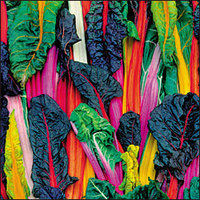
I don’t know what my problem is, but eating my vegetables has never really been a problem. We had a huge garden growing up and even as a little kid I was pretty open minded about eating all veggies. However, tons of people don’t like broccoli, cauliflower, cabbage, and greens like kale and mustard. These people are highly sensitive to the sulfur containing compounds that the Brassicaceae (this family of veggies) are full of. To some, it tastes foul, astringent, or like garbage. However, this group of phytochemicals (chemicals derived from plants) have possibly the most convincing health benefits of all studied phytonutrients.
Read on to find out about how broccoli (and its relatives) could save your life!
The Brassicaceae (broccoli & friends) contain high amounts of checmicals called glucosinolates. These chemicals are sugar linked, and when you break open the cells by eating the vegetables – and all of these vegetables require a pretty solid amount of chewing if eating them raw – the chemical loses its sugar and becomes an isothiocyanate. The most common isothiocyanate studied is sulforaphane, which has anticancer, antidiabetes, and antimicrobial properties. The last part makes sense because these veggies want to protect themselves from opportunistic bacteria, parasites, and herbivores with these compounds. This is actually further good for us, because if you can’t afford to buy all of your veggies organic, these veggies naturally have low pesticide loads because they just don’t need them.
 Maybe you noticed in the last spiel that these chemicals have anticancer properties. Now, if you’re a chemist like me, you look at the chemical structure and say ‘That looks like it would be an ok antioxidant.’ And it is, but interestingly, that’s not how it prevents cancer. These compounds (namely sulforaphane) induce a wide variety of enzymes involved in reactive oxygen response and inflammatory response, many of which protect against cancer-inducing stimuli (like too much sun and certain chemicals). These compounds are highly chemoprotective, though the recent studies have failed to find a link between high vegetable intake in the human diet and lowered incidence of cancer.
Maybe you noticed in the last spiel that these chemicals have anticancer properties. Now, if you’re a chemist like me, you look at the chemical structure and say ‘That looks like it would be an ok antioxidant.’ And it is, but interestingly, that’s not how it prevents cancer. These compounds (namely sulforaphane) induce a wide variety of enzymes involved in reactive oxygen response and inflammatory response, many of which protect against cancer-inducing stimuli (like too much sun and certain chemicals). These compounds are highly chemoprotective, though the recent studies have failed to find a link between high vegetable intake in the human diet and lowered incidence of cancer. There are many glucosinolate supplements you can take if you really hate the Brassicaceae, but I don’t recommend taking them if you’re taking any prescription drugs until you consult with your doctor. These supplements have wide ranges of concentration and they mess with the enzymes in your liver (Cytochrome P450s) that metabolize your pharmaceuticals. However, naturally occurring levels of glucosinolates have never been associated with inhibition of these enzymes, so you can eat a lot of cauliflower without worrying about your drugs failing to absorb correctly.
Speaking of glucosinolates, I’ll be eating some delicious asparagus in the future. We went to the farmers market this morning and check out these gargantuan stalks:
I’ll show you my recipe tomorrow or Tuesday. Until then, it’s time for wine and papers…I’m onto something cool with my TB project and I’m eating up all the literature I can find trying to determine if it’s the right direction for my research to go!
Happy Saturday night!


FANTASTIC blog girl! I can't wait to read more!!! :-)
ReplyDeletepurple asparagus! now what are those anthocyanins (or is it something else)? ;)
ReplyDeleteIt's probably some kind of anthocyanin or flavinoid. Anything purple is usually a flavinoid: All those double bonds can really absorb light!
ReplyDelete